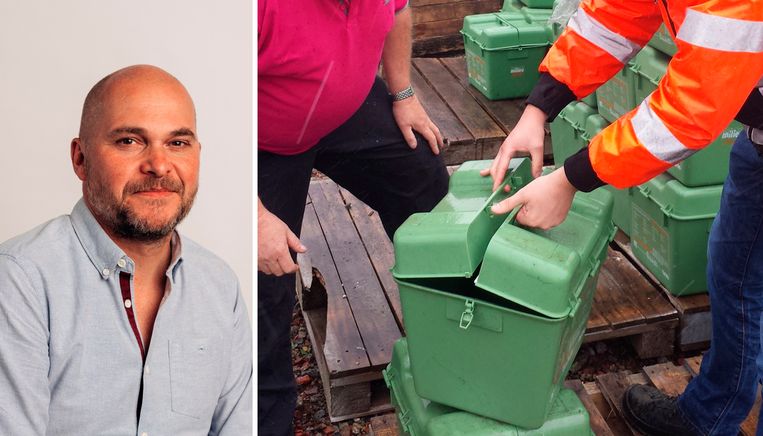Bart Eckhout is the main commentator for the morning.
Who remembers the Environmental Fund? In some Flemish households, you still find that ugly green plastic box for storing empty bottles, paint residue or other rubbish. What the Environmental Fund is definitely not used for is the collection of small hazardous waste. This was the reason why then Environment Minister Theo Keltermans (CVP) introduced the fund in the early 1990s. The system was very clumsy and many Flemish people were soon trashing the environmental fund themselves.
The smell of an environmental fund is now swirling around the current Flemish government’s decision to potentially introduce digital deposits. Just as the environmental fund was supposed to collect waste separately, the idea behind deposits for beverage packaging is also a good one. Flying waste from bottles and cans greatly affects our nature. It looks dirty, environmentally destructive, and absolutely lethal to field and pasture animals. It was excellent news that this Flemish government, after the procrastination of all previous governments, was still willing to offer a deposit to encourage consumers to return empty containers.
The time could come in 2025. But that’s the good news for now. For some reason, the Flemish government is convinced that it is a good idea to arrange the deposit digitally. This would require a complex system that includes an app, a scanner, and QR codes for separate trash bags and trash cans.
This is where the Environmental Fund’s alarm sounds. An unnecessarily complex and questionable system is designed to solve a serious but relatively easy problem, which threatens to become a regulatory failure. Why make it complicated when it is simple, just like in all other countries that deal with deposits?
Everyone who says the Environment Fund says it is a reference to political corruption. As far as we know, this does not exist with digital deposit. But the fingerprints of all kinds of lobbyists are in the file. The packaging and distribution sector itself is aggressively pushing towards digital transformation, which relieves it of a great deal of practical responsibility and provides a wealth of proprietary data. Companies that want to regulate digital transformation also have lobbying power through political connections. N-VA MEP Johan Van Overtveldt sits on the board of one, and port giant Fernand Huts has an interest in another. Conversely, the pressure against digitalization is also sponsored by an interested company.
Thus deposits became an unsavory issue. This is unfortunate, because the goal remains noble. The Flemish government wants to decide at the end of this year. Currently, there is no convincing evidence that digital works better. On the contrary, the risks of complexity, fraud and breach of privacy remain high.
“We will conduct a digital test,” competent minister Zuhal Demir (N-VA) previously told this newspaper. “If it works: good. If it doesn’t work: that’s okay too. If the Minister does not want her name associated with an unpopular and unwieldy system like the Environmental Fund, her choice should have already been made.

“Coffee buff. Twitter fanatic. Tv practitioner. Social media advocate. Pop culture ninja.”











More Stories
Strong increase in gas export pipeline from Norway to Europe
George Louis Bouchez still puts Julie Tatton on the list.
Thai Air Force wants Swedish Gripen 39 fighter jets